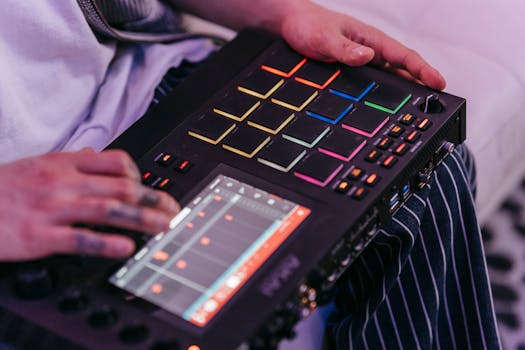Unlocking Your Inner Bard: What’s the Best AI Tool For Song Lyrics?
Introduction
Feeling that creative spark but struggling to find the right words to capture it? You’re not alone. For centuries, songwriters have wrestled with writer’s block, the elusive perfect rhyme, and the challenge of translating raw emotion into compelling lyrical narratives. But what if there was a digital muse, a tireless co-writer ready to help you craft your next masterpiece? In today’s rapidly evolving tech landscape, AI is stepping into that role, offering powerful new ways to generate, refine, and inspire song lyrics. But with so many options popping up, you might be wondering: what’s the best AI tool for song lyrics?
This post is your comprehensive guide. We’ll demystify the world of AI lyric generators, explore what makes a tool truly effective, and help you navigate the options to find the perfect fit for your songwriting journey. We’ll break down the core concepts, dive into practical tips, showcase real-world applications, and even weigh the pros and cons to equip you with the knowledge to make an informed decision.
The Rise of the Digital Muse: AI and Song Lyrics Explained
The idea of using technology to aid artistic creation isn’t entirely new, but AI‘s ability to understand and generate human-like text has revolutionized the possibilities. At its core, an AI tool for song lyrics leverages complex algorithms, often powered by natural language processing (NLP) and machine learning, to analyze vast datasets of existing songs, poetry, and literature. This allows the AI to learn patterns, understand rhyme schemes, explore thematic connections, and even mimic different writing styles.
Think of it like a highly sophisticated linguistic chameleon. These tools can be trained on everything from classic folk ballads to modern hip-hop anthems. When you provide a prompt – perhaps a theme, a mood, a few keywords, or even a melody – the AI can then generate suggestions, complete verses, or offer entirely new lyrical directions. It’s not about replacing the songwriter’s soul, but rather about augmenting their creative process. For anyone who has stared at a blank page, the appeal of having a powerful assistant is undeniable. This technology is relevant today more than ever as artists across genres seek innovative ways to express themselves and connect with audiences.

Another powerful use case is exploring different lyrical styles. If you’re a rock songwriter looking to experiment with a more poetic, folk-inspired style, you can use an AI tool trained on folk music to generate verse options in that vein. This allows for rapid experimentation without having to deeply research and internalize a new style from scratch.
Consider the case of Sarah, an indie-pop artist. She often starts with a melodic phrase and needs lyrics that fit the melancholic yet hopeful mood. Sarah uses an AI lyric generator that allows her to input her melody’s general feel and a few keywords like “rainy days” and “lost love.” The AI then generates multiple verse options, often suggesting evocative imagery and rhyming patterns she wouldn’t have thought of. She then cherry-picks the best lines, rephrases some, and stitches them together, creating a foundation for her song. This process has significantly reduced the time she spends on initial lyric drafting, allowing her to focus more on melody and arrangement.
For a deeper dive into how AI is transforming creative industries, you might find this article on the impact of AI on creative workflows insightful. Additionally, if you’re interested in the technical side, understanding how AI understands language can be incredibly illuminating.
The AI Lyric Toolkit: A Look at Popular Options
While the landscape is constantly evolving, several AI lyric generators stand out for their capabilities and user experience. It’s important to note that “best” is subjective and depends on your individual needs. However, some tools consistently rank high in terms of functionality and creative output.
Rytr: Known for its versatility across many writing tasks, Rytr offers a dedicated “Song Lyrics” use case. It’s praised for its user-friendly interface and ability to generate creative content based on simple prompts. It allows you to choose from various tones and has a good balance between generating coherent text and offering creative twists.
Jasper AI (formerly Jarvis): A powerhouse in AI content generation, Jasper can be a formidable tool for songwriters. While not exclusively a lyric generator, its advanced language models can be directed to produce song lyrics with impressive creativity. It’s particularly good at generating longer-form lyrical content and maintaining a consistent narrative.
Deep-Writing.ai: This platform is specifically designed with creative writing in mind, including song lyrics. It offers a range of templates and prompt options to help users craft lyrics across different genres and moods. Its focus on creative output makes it a strong contender.
LyricStudio: As the name suggests, LyricStudio is purpose-built for songwriters. It’s designed to help you find rhymes, generate alternative phrasing, and explore different lyrical directions based on your existing lines. It’s less about generating a full song from scratch and more about assisting with specific lyrical challenges.
ChatGPT & Other Large Language Models (LLMs): While not dedicated lyric tools, general-purpose LLMs like ChatGPT can be surprisingly effective. By crafting detailed prompts that specify genre, mood, theme, rhyme scheme, and desired emotional tone, you can elicit impressive lyrical content. The key is learning to prompt effectively.
When evaluating these, consider which ones offer the specific features most important to your songwriting process. Experimenting with free trials is highly recommended!

Weighing the Options: Pros and Cons of AI Lyric Tools
Like any powerful tool, AI lyric generators come with their own set of advantages and disadvantages. Understanding these can help you set realistic expectations and use them most effectively.
| Pros | Cons |
|---|---|
| ➕ Overcomes Writer’s Block: Provides instant inspiration and starting points. | ➖ Can Be Generic: Without careful prompting, output may lack originality or personal voice. |
| ➕ Speeds Up Drafting: Significantly reduces the time spent on initial lyric creation. | ➖ Lacks True Emotion: AI doesn’t experience emotions, so genuine feeling needs to be infused by the human artist. |
| ➕ Explores New Ideas: Suggests unique rhymes, metaphors, and lyrical concepts. | ➖ Dependency Risk: Over-reliance can hinder the development of your own unique songwriting voice. |
| ➕ Aids Rhyme and Meter: Helps craft structured and rhythmically consistent lyrics. | ➖ Ethical Considerations: Questions about authorship and originality can arise. |
| ➕ Accessible to Beginners: Lowers the barrier to entry for aspiring lyricists. | ➖ Quality Varies: Not all outputs are usable; significant editing is often required. |
Your AI Co-Writer: Best Practices for Success
To truly leverage the power of AI lyric generators and find the best AI tool for song lyrics that suits you, adopting smart practices is key. It’s about collaboration, not delegation.
- Be Specific with Your Prompts: The more detailed your instructions, the better the AI can understand your vision. Include genre, mood, theme, keywords, and desired rhyme scheme.
- Iterate and Refine: Don’t accept the first output. Generate multiple options, mix and match lines, and edit heavily. Think of the AI as providing raw material.
- Inject Your Own Voice: The AI provides words, but you provide the soul. Rewrite lines to reflect your personal style, experiences, and emotions.
- Focus on Storytelling and Emotion: Use the AI to help build the structure and find the words, but ensure the narrative and emotional arc are yours.
- Experiment with Different Tools: As we’ve discussed, different tools excel in different areas. Try a few to see which one best complements your workflow.
- Learn Prompt Engineering: The art of asking the right questions is crucial. Experiment with different phrasing and levels of detail in your prompts.
- Don’t Forget the Music: Lyrics are only half the song. Ensure your AI-generated lyrics fit the melody, rhythm, and overall feel of your music.
By approaching AI lyric generation as a partnership, you can unlock new creative potential and produce more compelling songs than ever before.
Conclusion: Finding Your Perfect AI Lyric Partner
So, what’s the best AI tool for song lyrics? The truth is, there isn’t a single, universal answer. The ideal tool is the one that best aligns with your personal songwriting style, your creative process, and your specific needs. Whether you’re looking to break through writer’s block, experiment with new styles, or simply speed up your drafting process, AI offers an incredible array of possibilities.
From versatile platforms like Rytr and Jasper AI to specialized tools like LyricStudio, the options are diverse and powerful. Remember to experiment, be specific with your prompts, and always infuse the AI‘s output with your own unique voice and emotional depth. AI is not here to replace the songwriter; it’s here to empower you.
Now it’s your turn. Dive in, explore the tools, and start crafting your next lyrical masterpiece. Don’t be afraid to play, experiment, and discover how a digital muse can help your creativity soar. Happy writing!